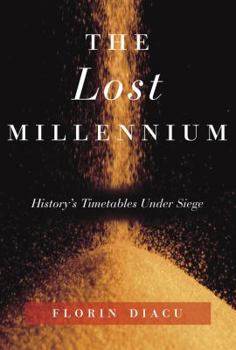The Lost Millennium: History's Timetables Under Siege
Select Format
Select Condition 
Book Overview
Have you ever wondered how we really know what year it is? Part detective story, part conspiracy theory, part scientific history, The Lost Millennium explores the astonishing possibility that our... This description may be from another edition of this product.
Format:Hardcover
Language:English
ISBN:0676976573
ISBN13:9780676976571
Release Date:December 2005
Publisher:Knopf Canada
Length:309 Pages
Weight:1.10 lbs.
Dimensions:1.0" x 6.1" x 8.5"
Customer Reviews
4 ratings
Interesting book
Published by Thriftbooks.com User , 16 years ago
Florin Diacu's The Lost Millenium approaches the issues of revising chronology from an astronomy perspective. He shows how our present understanding of chronology doesn't line up with our knowledge of astronomy. He quite rightly shows that there are issues with Fomenko's reconstruction of Chronology. However what is perhaps most valuable about Fomenko is the mass of evidence showing that our existing chronology is unscientific. It would be good to see Florin Diacu concentrate more on that. If we examine the history of different texts we see that until the 'Revival of Letters' and the printing press, works like the Bible appear to have been practically non-existent as far as the historical record shows. People were not really familiar with the classics, bible, and church fathers till the era of printing. In English one can also refer to Edwin Johnson for more information. Wikipedia has links to his works, including The Pauline Epistles. In many ways the classics reflect the concerns of the renaissance, while the bible reflects the religious arguments of the different sides in the reformation era. (Just as the Book of Mormon shows a current understanding of 19th Century theological arguments in New York State.) The further one examines the subject the less clear it is what on really knows about the past prior to the age of publication. This book is important because it shows that there is solid evidence that our knowledge of the past is dubious.
objective account and fun to read
Published by Thriftbooks.com User , 17 years ago
A must read for anyone who wants an objective account on Fomenko's views. there are also brief accounts on Peter James and David Rohl. maybe in a second edition professor Diacu will venture into the minds of the German revisionists Uwe Topper, and Herbert Illig. so far they sound more convincing to me than Fomenko, although Fomenko's results for the almagest do destroy the main pillar of traditional chronology. Diacu speaks of the dark ages in the middle ages but never really gets into it. Herbert Illig for example proposed that 300 years should be taken out of the chronology, according to him the years between 600 AD and 900 AD. if anyone was convinces by Peter James Centuries of Darkness, he should be convinced by Illig. the proofs are very similar, and they were very convincing to me. in conclusion, Diacu has managed to summarize Fomenko in mere 200 pages and he did it in a fun way. there is still space for lets say 100 pages exploring the views of the German revisionists, this would give the reader more places were to choose from.
A great read
Published by Thriftbooks.com User , 19 years ago
This book filled my winter holidays with joy! I always thought mathematicians cannot write, but Diacu proved me wrong. He succeeded to grip my attention from the beginning and kept me focused until I read the very last line. Now I am reading this book for the second time because I want to fix the ideas, and I find it as fresh and engaging as the first time. Diacu's quest to learn the truth, his enthusiasm and care for detail are worth noting. A read that made me think more intensly than I did in years.
Challenging Historical Chronology
Published by Thriftbooks.com User , 19 years ago
Being an avid reader of history books, especially ancient history, I have always taken for granted that when a historian stated that an event occurred in a certain year in the distant past, that that year was correct - especially if conventionally accepted among historians - within, perhaps, a small margin of error. Before reading this book, I was not aware of the challenges that have been made in the past, and that are still being made today, to conventional historical chronology - challenges that propose to shorten recorded history by as much as one thousand years! The main reformist in this field these days is Anatoli Fomenko, a well-respected Russian mathematician on whose work most of this book is based. The author, also a mathematician, uses an unbiased and objective approach in analyzing Fomenko's theories and methods. He also discusses the traditionalists' reactions to Fomenko's results. Although it is easy to sense that history's timetables are not about to be overturned any time soon based solely on Fomenko's work, the author does suggest ways in which some traditional dates can be confirmed. Observing the scientific method at work is always interesting for me. This is a fascinating book. It is very well written in a clear and engaging style; and, for me, it was quite a page-turner.





